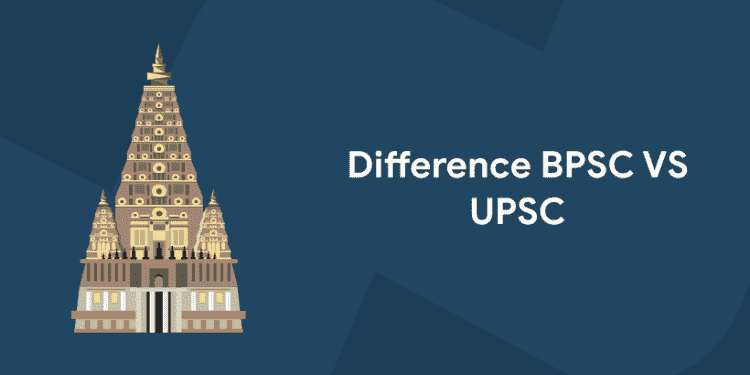Table of Contents
BPSC stands for Bihar Public Service Commission and UPSC Stands for Union Public Service Commission. Both examinations are one of the most prestigious exams in the country. The BPSC exam is a State Level PSC Exam and UPSC is a National Level PSC Exam. Notifications of both BPSC and UPSC has been out and aspirants are waiting for their results of 2019. In this blog we will cover all the aspects of both the examination such as Eligibility Criteria, Exam Pattern, Salary Details, etc. Candidates who are still trying to decide which exam is better can go through this blog on the difference between BPSC and UPSC.
Bihar Public Service Commission, BPSC, has released the recruitment notification to fill vacancies under different Engineering posts. The notification was released on 13th September 2019. This is a great opportunity for fresh Engineering Graduates too, to join the government service in the related post.
The Union Public Service Commission conducts the Civil Services Examination every year for recruitment of officers to the prestigious Civil Services of India. Candidates who are successful to clear this exam can become civil servants in various offices of the government such as the Indian Administrative Service, Indian Police Service, Indian Revenue Service etc Some candidates opt to become diplomats by joining the Indian Foreign Service. Lakhs of candidates appear for this prestigious examination every year hoping to enter the elite services and serve the country. However, only about a thousand make it hence it is called India’s toughest exam.
Download Entri today to ace your BPSC exams!
Difference Between BPSC and UPSC: Eligibility Criteria & Age Limit
BPSC Eligibility Criteria
The candidate must hold a degree of any of Universities incorporated by an Act of the Central or State Legislature in India or other educational institutions established or declared to be deemed as a University Under Section-3 of the University Grants Commission Act,1956, or possess an equivalent qualification.
The BPSC Age Limit for General Category male aspirants is:
- Minimum Age – 22 years
- Maximum Age – 37 years
The age limit and other BPSC eligibility criteria vary for different services and categories.
| Post/Service Name | Minimum Age |
| Deputy Superintendent of Police | 20 years |
| Probation Officer | 21 years |
| Rural Development Officer | 21 years |
| Labour Enforcement Officer | 21 years |
| Block SC/ST Welfare Officer | 21 years |
| Supply Inspector | 21 years |
| All other posts | 22 years |
The upper age limit for BPSC is given in the table:
| Category | BPSC Upper Age Limit |
| General Category – Male | 37 years |
| General Category – Female | 40 years |
| BC/OBC (Male, Female) | 40 years |
| SC/ST (Male, Female) | 42 years |
Important points regarding BPSC Age Limit
- Candidates need to fulfill the criteria mentioned above.
- The candidates who have been in the government service for the last three years have the following number of attempts:
- Number of Attempts: 3
- Relaxation in Upper Age Limit: 5 years
- Persons with Disability (PwD) have an upper age limit is relaxed by 10 years.
- Ex-servicemen who are not above 53 years of age, can avail BPSC age relaxation of three years plus the number of years in service.
UPSC Eligibility Criteria
Please note that the following eligibility criteria are tentative and candidates should refer to the official IAS Notification on 19th February 2019 for any changes. You can check this link https://www.upsc.gov.in/.
| Nationality (Citizenship) | Candidates applying for IAS and IPS have to be citizens of India.
|
| Educational Conditions: | · Candidates must hold a bachelor’s degree from a recognized university.· Students in the final year or semester of their bachelors’ degree can appear for the Prelims but have to produce the provisional or original degree before the Mains exam. |
| Age Limits | · Age limit is Minimum 21 years to maximum 32 years· Relaxation in upper age limit available for the following categories:
(a) Scheduled Caste(SC) and Scheduled Tribe (ST) – 37 years (b) Other Backward Classes (OBC) – 35 years (c) Defence Personnel disabled in hostilities and released from service as a consequence – 35 years (d) Ex-servicemen with at least 5 years of service – 37 years (e) Serving ECOs and SSCOs with at least 5 years of service – 37 years (f) Disabled candidates – Up to 42 years based on the type of disability. The rules regarding age limits are complex and should be studied carefully before applying. |
| Number of Attempts | General – 6SC/ST – No restrictions
OBC – 9 PH – Based on category |
Difference Between BPSC and UPSC: Exam Pattern
BPSC Exam Pattern
As per the BPSC Exam is conducted in three stages as follows;
The salient aspects of the BPSC exam pattern are:
| BPSC Prelims | Mains | Interview |
|
|
|
UPSC Exam Pattern
The Preliminary Examination would consist of two papers as described below:
| Subject | Total marks | No. of questions | Duration | Type | Negative marks | Nature |
| General Studies Paper 1 | 200 | 100 | 2 hours | Objective | Yes | Qualifying |
| General Studies Paper 2 (CSAT) | 200 | 80 | 2 hours | Objective | Yes | Qualifying |
The written part of the UPSC Civil Service Mains Examination consists of nine papers which are descriptive in nature:
| Paper | Subject | Nature of the paper | Duration | Total marks |
| Paper A | Compulsory Indian language | Qualifying | 3 hours | 300 |
| Paper B | English | Qualifying | 3 hours | 300 |
| Paper I | Essay | Merit ranking | 3 hours | 250 |
| Paper II | General Studies I | Merit ranking | 3 hours | 250 |
| Paper III | General Studies II | Merit ranking | 3 hours | 250 |
| Paper IV | General Studies III | Merit ranking | 3 hours | 250 |
| Paper V | General Studies IV | Merit ranking | 3 hours | 250 |
| Paper VI | Optional I | Merit ranking | 3 hours | 250 |
| Paper VII | Optional II | Merit ranking | 3 hours | 250 |
Optional subjects for Paper VI and VII are to be selected from a list of subjects declared in the notification. UPSC sets and evaluates optional papers at a level slightly higher than an undergraduate learning level but below the learning level required for a masters degree.
Download Entri today to ace your BPSC exams!
Difference Between BPSC and UPSC: Syllabus
BPSC Exam Syllabus
The subjects includes in BPSC Exam are as follows;
- The first stage i.e. Prelims is a objective type exam. Prelims exam comprises of one paper i.e General Studies. BPSC prelims exam has no negative marking.The Prelims Syllabus contains the following topics:
- General Science
- Events of national and international importance
- History of Bihar and Indian History
- Geography
- Geography of Bihar
- Indian Polity and Economy
- Changes in the economy of Bihar post-independence
- Indian National Movement and Role of Bihar
- General Mental Ability
UPSC: Syllabus
The UPSC Syllabus is vast and covers the subjects mentioned in the notification in a broad manner. For prelims, the syllabus covers topics of general interest as well as basic numeracy up to class X level. Prelims exam tests the candidates on the following topics:
| Current events of national and international importance. | History of India and Indian National Movement. | Indian and World Geography | Indian Polity and Governance | Economic and Social Development |
| General issues on Environmental ecology, Bio-diversity and Climate Change | General Science. | Comprehension; | Interpersonal skills including communication skills | Logical reasoning and analytical ability |
| Decision making and problem solving | General mental ability | Basic numeracy (numbers and their relations, orders of magnitude, etc.) (Class X level), Data interpretation (charts, graphs, tables, data sufficiency etc. — Class X level) |
The Mains exam syllabus is even more comprehensive and covers a wide range of subjects in great detail. The level of learning required for the mains is typically above an undergraduate learning level. The following are the list of optional subjects for mains:
| Agriculture | Animal Husbandry and Veterinary Science | Anthropology | Botany | Chemistry |
| Civil Engineering | Commerce and Accountancy | Economics | Electrical Engineering | Geography |
| Geology | History | Law | Management | Mathematics |
| Mechanical Engineering | Medical Science | Philosophy | Physics | Political Science and International Relations |
| Psychology | Public Administration | Sociology | Statistics | Zoology |
| Literature of any one of the following languages: Assamese, Bengali, Bodo, Dogri, Gujarati, Hindi, Kannada, Kashmiri, Konkani, Maithili, Malayalam, Manipuri, Marathi, Nepali, Odia, Punjabi, Sanskrit, Santhali, Sindhi, Tamil, Telugu, Urdu and English. | ||||
The subjects which are covered by the General Studies Papers in Mains Exam are:
| General Studies I | General Studies II | General Studies III | General Studies IV |
| Indian Heritage and Culture | Governance | Technology | Ethics |
| History and Geography of the World | Constitution | Economic Development | Integrity |
| Society | Polity | Bio-diversity | Aptitude |
| Social Justice | Environment | ||
| International relations | Security and Disaster Management |
Difference Between BPSC and UPSC: Job Profile
BPSC Job Profile
- Bihar Public service commission is conducted at a state level it has various posts such as DSP, SDM, Financial Service and Adminitrative services.
- To check out the detailed job roles of all the post under BPSC click here.
- The candidates selected in such state services needs to be truthful and follow all the rules made by the State Government Judiciously.
UPSC Job Profile
- Union Public Service Commission is conducted at a National Level and has similar posts in Administrative, FInanace, Labour, Police and many other departments under the government of india.
- Only a handful of candidates gets selected for UPSC hence they have quite heavy duties.The UPSC candidates selected as IAS and IFS officers lead the country in higher administration and help in building the integrity of the country.
- An IAS makes sure that the development of his/her country is going in the correct directions by ensuring justice to the responsibilities they have been allocated to.
That will be all from our end at Entri, hope your idea of joining into any of the above organization is clearer now. Entri wishes you all the best for your upcoming examinations. Start your Preparation today itself. Entri will help you with thousands of questions. Attempt mock tests, analyze yourselves improve your success rate.
To get higher ranks in competitive exams! Download and subscribe to Entri!
| Related Courses | ||
| RRB Exams Coaching | RRB JE Online Coaching | SSC JE Online Coaching |
| SSC Online Coaching | UPSC Online Coaching | Bank Exam Coaching Online |












